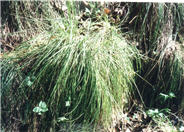
Common name:Mediterranean Fan Palm
Botanical name:Chamaerops humilis
This slow growing palm reaches10' tall (may take 10 years) and 5'-15' wide. It typically forms multiple trunks. This hardy palm has fronds with sharp teeth that may be rich green or yellow green in color. This clumping plant looks great in containers. It tolerates full to part sun. Once it's established, it needs occasional watering. This palm does well in frost as well as desert heat. It's great for a tropical look.

Common name:Purple-Leaf Acacia
Botanical name:Acacia baileyana 'Purpurea'
This attractive evergreen tree quickly reaches 20'-30' tall and wide. It has a compact, dense habit with weeping branches. Foliage is soft looking, with textured feathery, blue gray, silvery leaves. New foliage is purple. Bright yellow, fragrant clusters of flowers appear in winter and spring. Birds love this tree. Prune to create a shrub, if desired. This will encourage more purple foliage. Once established, it is cold and drought tolerant.

Common name:Blue Fescue, Blue Fescue Grass
Botanical name:Festuca glauca
This ground cover/grass will grow less than 1' tall and has small, blue-green, evergreen leaves that are very thin and hair-like. Flowers appear in the summer but are insignificant. This dependable ground cover prefers full sun in coastal areas and afternoon shade in warm inland areas. It needs well draining soil and is drought tolerant once it's established. Leaves may burn during the summer but trim in winter to keep it looking refreshed.

Common name:Clumping Gazania, Treasure Flower
Botanical name:Gazania 'Sun Gold'
A moderately fast, low groundcover, grey fuzzy leaves with bright yellow daisies held above the foliage. Prefers light soil and good drainage and full sun to light shade. Allow plants to be irrigated in mornings so that foliage is dry at dusk. Tolerant and dependable for tough situations needing only some additional irrigation during the hottest seasons.

Common name:Red Yucca
Botanical name:Hesperaloe parviflora
This spectacular succulent grows to 3'-4' tall and wide. Blue green leaves are strap-like, leathery, long, with white fraying fibers on the edges. During the summer, dark pink flowers are seen on red flower arching stalks. Hummingbirds love these flowers. This evergreen plant is drought tolerant once it's established but will appreciate extra water during the summer to promote blooms. Plant in full sun or light shade, with well draining soil. Deer like the foliage. This plant looks great in pots.

Common name:Grey Desert Spoon, Sotol
Botanical name:Dasylirion wheeleri
Grey desert spoon requires little maintenance and is popular in desert themed gardens. Plants tolerate drought, reflected heat and poor soils. It slowly develops a short, thick trunk while reaching 6' tall and wide. Leaves look like swords, are 3' long gray-green with thorns on the margins. During late spring to summer, an erect stem of white creamy flowers emerge from the center, up to 10' high. This long lived plant needs well draining soil. Do not plant near walkways.

Common name:California Fescue
Botanical name:Festuca californica
The California Fescue is a cool season bunchgrass with blue-green blades that reach 2' high. The violet colored flower stalks are 5' tall, appearing in spring and summer, creating fountain-like clumps. This grass is drought tolerant for sun and shade although it looks better with additional summer water. The California fescue is native to CA and is a beneficial insect plant. Plant on dry sunny slopes or on the edge of a dry creek bed.

Common name:Yellow Dietes or Fortnight Lily
Botanical name:Dietes bicolor
This clumping perennial iris relative stands 3'-4' high. It has light- yellow, iris-like flowers with maroon blotches that are about 2" wide. It performs best in full sun and in soil with good drainage.

Common name:Tree Roses
Botanical name:Rosa Tree varieties
Tree roses are actually shrubs that have been grafted or grown in a way that looks like a tree, ie with a trunk. Tree roses can be floribundas, hybrid teas, or grandifloras. They are typically used as specimen plants. Make sure the plant is tied to a stake in case of strong winds. They reach 3'-6' tall.
| Designer: | Southwest Story |
Photographer: GardenSoft |
Soils and Compost:
Maintain a two to four inch layer of mulch on the soil surface to reduce weeds, infiltrate rain water, and reduce compaction.
Water Saving Tip:
In general, lawns only need to be watered once every three days.
Check your irrigation controller and reduce watering times if necessary.
Integrated Pest Management:
Develop healthy soil for plants that are vigorous and naturally pest-resistant.
